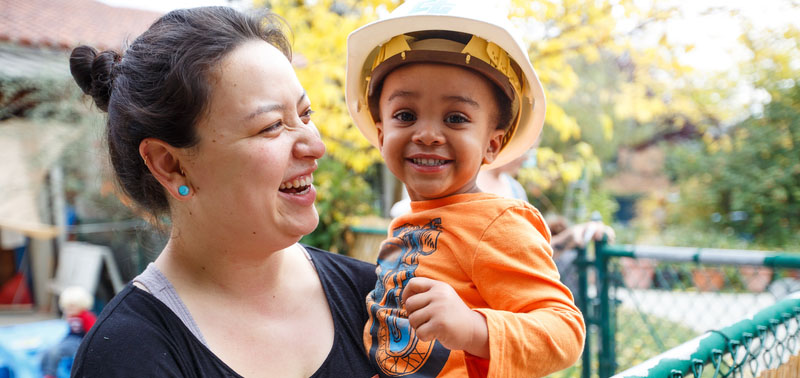
Our Early Childhood program includes Toddler (T), Younger Preschool (YPS), and Transitional Kindergarten (TK) classrooms.
Toddler program at a glance:
- Children enrolled range from 24 to 35 months old when school starts in late August
- Target size of 12 students with a 1:4 teacher:child ratio
- Two pick-up options: 8:30 am–3:00 pm or 8:30 am–5:30 pm
- Highly-qualified head teachers and dedicated support teachers
- Beautiful, developmentally-appropriate classroom and outdoor play space, plus access to nature across the Mills College at Northeastern University campus
In the Toddler (T) classroom, we implement a primary caregiving model, where each teacher focuses their care and attention on two to three children. These primary caregivers support the parent-child transition to and from school, track the child’s needs throughout the day, help the child with most of their diapering, sleeping, and eating needs, and serve as a secure base from which to explore.
In our Early Childhood program, each classroom is staffed by a highly qualified head teacher, each with their own dedicated team of teachers. Teaching teams meet to reflect on ways to support the children and their learning, as well as to discuss the implementation of theory to practice to ensure quality care.
The daily schedule is based on reading children’s cues and meeting their individual needs. The essential caregiving curriculum of napping, eating, diapering, and playing happen as needed for different children at different times throughout the day. The rest of the learning curriculum evolves as teachers carefully observe the interests of the children and implement new activities, themes, and materials to help them explore their curiosity further, adding new challenges to their ways of thinking and processing the world. Each of our Early Childhood programs provide a rich indoor and outdoor environment for children to explore and learn.
Having a wide age range among the students (children are 24-35 months old when the school year starts) has many benefits. Older children can scaffold learning for younger children and younger children promote empathy and caring in older children. During enrollment, teachers carefully consider age cohorts to promote friendships and support the adult learners, as well. The small class size allows teachers to meet each child’s specific needs as an individual learner in the context of the group. We value the diversity of our school and work in partnership with families to support their children’s positive identity, academic success, and social and emotional development. Maintaining diverse and balanced classrooms supports the children in our programs.
Learn More
- Tuition Schedule
- Early Childhood Admissions
- Please note that our Early Childhood calendar includes an extended winter break

